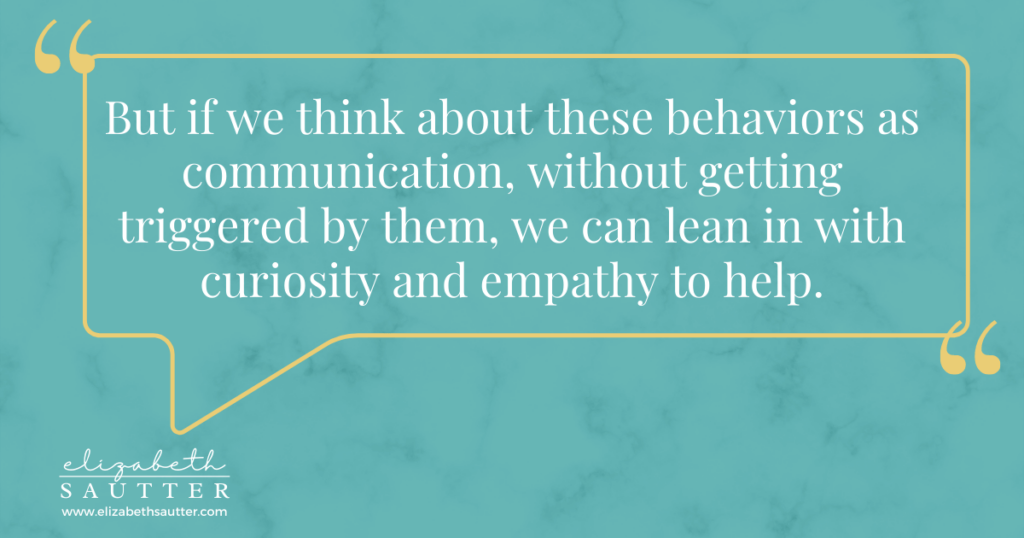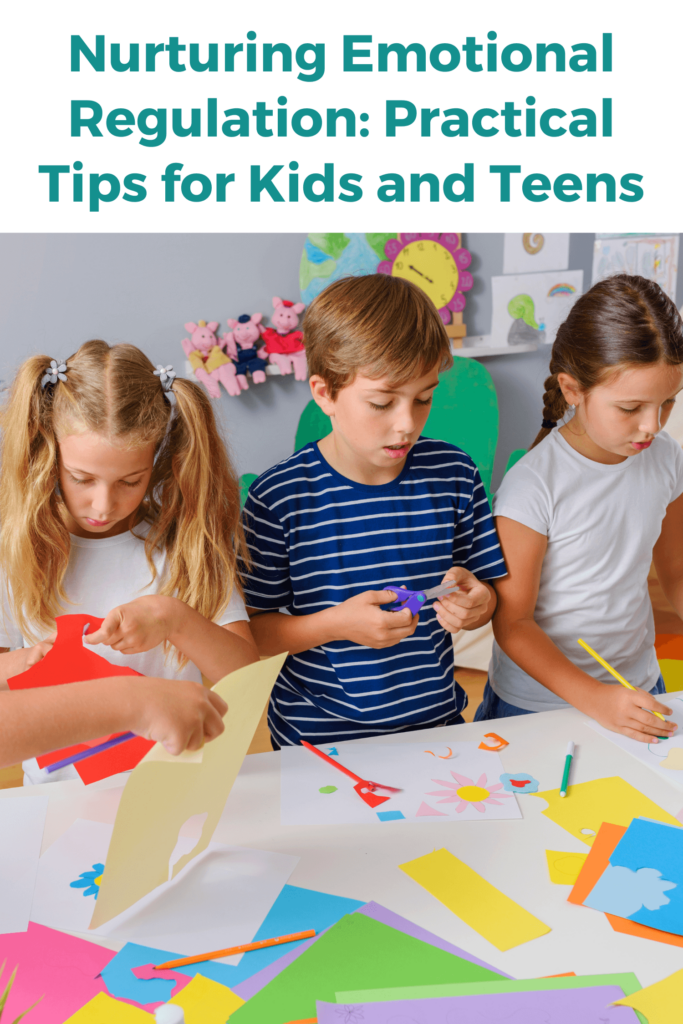And learning how to express how you feel, rather than just react, is super difficult. Did you know that understanding and managing emotions is actually a developmental skill? This is why it is often referred to as emotional intelligence (EQ).

As a speech therapist and mom, I have often said “use your words” to my children, assuming that they know how they feel and how to express those feelings. But this is not always the case, especially for children with language, attentional, or regulation delays. Or even if they don’t have challenges in these areas, it can be hard for children (or adults) to express their feelings when they are flooded with emotions.
This is why we see outward behaviors that might be difficult to understand.

This is the fun part! We can help kids increase their awareness, understanding, and ability to communicate in any form of communication to be able to get their wants and needs met with more ease.
Practical Tips for School-Age Kids:
- Modeling and Talking about Feelings: Children are watching us and absorbing what they see and hear us doing and saying. Whether we like it or not, it’s like they are trying to mirror us. There are actually neurons in our brain called mirror neurons that do just that! And we can embrace this knowledge and use it to our advantage by modeling how to express our feelings in an effective way. We can use our words when we are feeling angry, worried, or overwhelmed. To foster emotional regulation in kids, show them healthy ways to cope, like taking a deep breath, taking a break, or asking for a hug. Explain what you’re doing to care for your feelings, so they learn the language and the tools.
- Teaching Emotion Words through Books and Media: There are plenty of picture books that are great for teaching and talking about emotions. Create a list of emotions to discuss and look for in everyday situations. Utilize any book, comic, story, movie, or media to pause and point out how characters are feeling, discussing their facial expressions, body language, and behavior. This will bring awareness and build emotional literacy in kids.
- Daily Check-Ins: Feelings come and go throughout the day. By checking in with your child and asking simple questions like, “How are you feeling?” or “I notice that your head is low today, what’s up?”, or having them do a “check-in” with photos or other visual aids, you help them pause to think about their emotions and practice labeling them with words. Use fun visuals that kids can relate to, and pair these visuals with words that will give them a vocabulary for describing emotions.
- Encourage Emotional Exploration through Play: Play is a powerful way for kids to explore and express their emotions. Provide them with toys and activities that encourage emotional role-play, such as dolls, action figures, or puppets. This gives them a safe space to act out and understand their feelings, making it easier to express themselves in real-life situations.
- Create a Feelings Journal: Help your child create a feelings journal where they can write or draw about their emotions daily. Encourage them to document what made them feel happy, sad, excited, or angry. This practice promotes self-awareness and reflection, enabling them to develop better emotional regulation skills.
Practical Tips for Teens:
- Encourage Verbal Expression: Create a safe and open environment for teens to share their feelings without judgment. Listen actively and validate their emotions, making them feel heard and understood. Encourage them to express themselves verbally, as talking about feelings openly is essential for emotional regulation.
- Support Creative Expression: Teens may find it easier to express their emotions through creative outlets like writing, art, or music. Encourage these forms of expression as they can help teens process and communicate their feelings effectively. Provide them with the necessary tools and resources to explore their emotions through their preferred medium.
- Problem-Solving in Teachable Moments: Use real-life situations as opportunities for emotional learning. Discuss social situations, model behaviors, and engage in reflective problem-solving to equip teens with essential coping and management skills. Encourage them to analyze their emotions, think critically, and come up with constructive ways to handle various situations.
- Mindfulness and Breathing Techniques: Introduce your teen to mindfulness and breathing exercises to help them stay grounded during emotionally challenging situations. Practice deep breathing techniques together, which can reduce stress and improve emotional regulation.
- Encourage Journaling: Encourage your teen to keep a journal where they can freely write about their emotions, experiences, and challenges. Journaling can be therapeutic, providing an outlet for them to process their feelings and gain insights into their emotional landscape.
- Practice Empathy and Active Listening: Help your teen understand the importance of empathy and active listening in their relationships. Encourage them to put themselves in others’ shoes, listen attentively, and validate others’ emotions, which fosters healthier communication and emotional connections.
- Positive Coping Mechanisms: Promote positive coping mechanisms, such as exercise, creative expression, or spending time in nature. Encourage your teen to explore activities that bring them joy and help them manage stress in healthy ways.
Every child’s emotional journey is unique, and helping them express their feelings is essential for their social-emotional development. By following these practical tips for kids and teens, you can foster emotional intelligence and communication skills that will benefit them throughout their lives. Be patient, empathetic, and encouraging during this process, as building emotional awareness is a journey that requires time and support.
As parents, caregivers, and educators, we play a crucial role in nurturing our children’s emotional well-being and helping them thrive in their social interactions. Embrace the opportunity to connect with your child on an emotional level, and watch them grow into confident, emotionally intelligent individuals who can navigate life’s challenges with grace and resilience.
 Join the Upcoming Workshop –
Join the Upcoming Workshop – 
